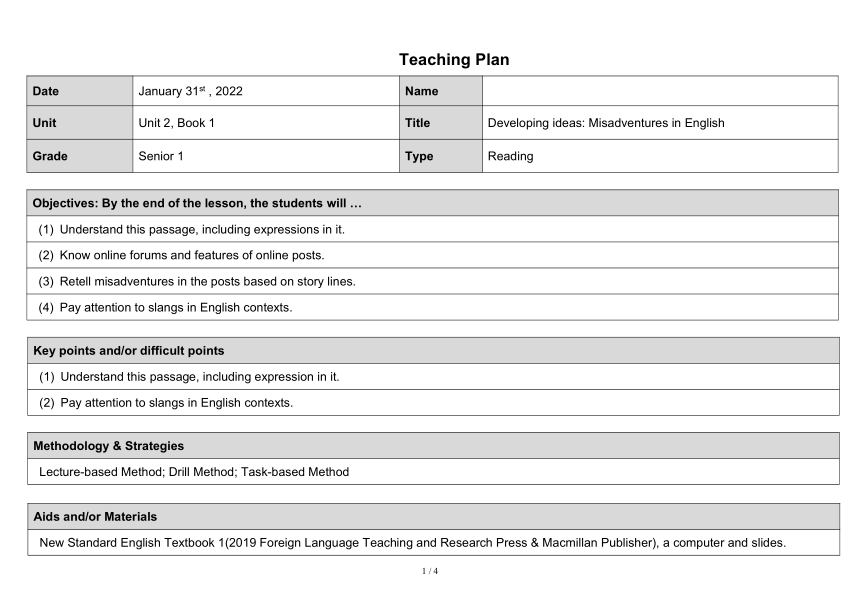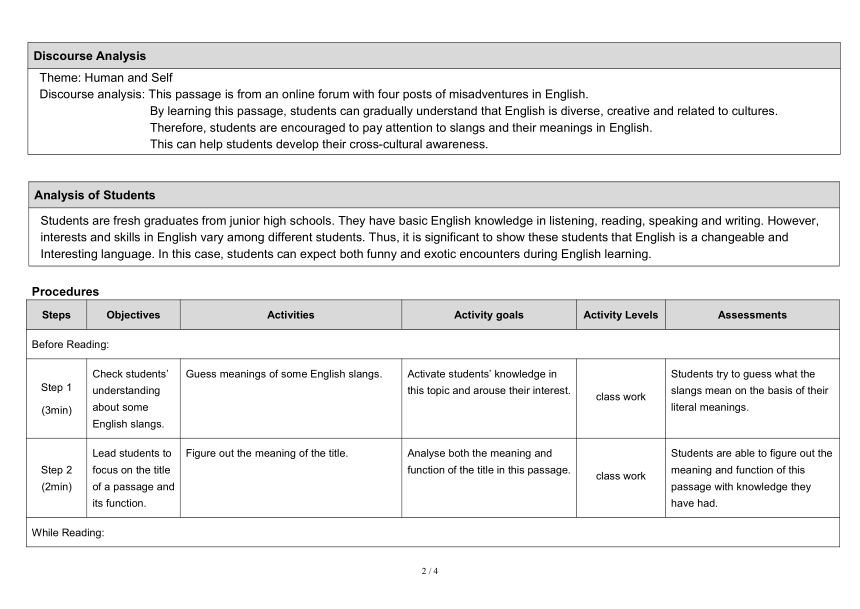外研版(2019)必修 第一册Unit 2 Exploring English Developing ideas-reading 名师教学设计
文档属性
| 名称 | 外研版(2019)必修 第一册Unit 2 Exploring English Developing ideas-reading 名师教学设计 |  | |
| 格式 | doc | ||
| 文件大小 | 58.7KB | ||
| 资源类型 | 教案 | ||
| 版本资源 | 外研版(2019) | ||
| 科目 | 英语 | ||
| 更新时间 | 2023-02-26 09:23:01 | ||
图片预览


文档简介
Teaching Plan
Date January 31st , 2022 Name
Unit Unit 2, Book 1 Title Developing ideas: Misadventures in English
Grade Senior 1 Type Reading
Objectives: By the end of the lesson, the students will …
Understand this passage, including expressions in it.
Know online forums and features of online posts.
Retell misadventures in the posts based on story lines.
Pay attention to slangs in English contexts.
Key points and/or difficult points
Understand this passage, including expression in it.
Pay attention to slangs in English contexts.
Methodology & Strategies
Lecture-based Method; Drill Method; Task-based Method
Aids and/or Materials
New Standard English Textbook 1(2019 Foreign Language Teaching and Research Press & Macmillan Publisher), a computer and slides.
Discourse Analysis
Theme: Human and Self Discourse analysis: This passage is from an online forum with four posts of misadventures in English. By learning this passage, students can gradually understand that English is diverse, creative and related to cultures. Therefore, students are encouraged to pay attention to slangs and their meanings in English. This can help students develop their cross-cultural awareness.
Analysis of Students
Students are fresh graduates from junior high schools. They have basic English knowledge in listening, reading, speaking and writing. However, interests and skills in English vary among different students. Thus, it is significant to show these students that English is a changeable and Interesting language. In this case, students can expect both funny and exotic encounters during English learning.
Procedures
Steps Objectives Activities Activity goals Activity Levels Assessments
Before Reading:
Step 1(3min) Check students’ understanding about some English slangs. Guess meanings of some English slangs. Activate students’ knowledge in this topic and arouse their interest. class work Students try to guess what the slangs mean on the basis of their literal meanings.
Step 2(2min) Lead students to focus on the title of a passage and its function. Figure out the meaning of the title. Analyse both the meaning and function of the title in this passage. class work Students are able to figure out the meaning and function of this passage with knowledge they have had.
While Reading:
Step 3(13min) Let students focus on slangs and attempt to guess their meanings according to contexts. Read through the passage and find out slangs that caused misunderstandings. Based on contexts, find out meanings of slangs that caused misunderstandings.Read definition of slangs that caused misunderstandings and match them to different people’s posts. Familiarize students with information in the passage and guess meanings of words by reading through the contexts individual work Students can understand the passage as a whole and find out meanings of the slangs with reminders.
Step 4(7min) Encourage students to get needed information from a passage accordingly and learn to transfer knowledge among different fields. Find out where readers can read posts of people’s misadventures in English. 2. Find out Internet language used in the passage and figure out their meanings. Familiarize students with information in the passage. Besides, introduce features of the language online to students. individual work Students are able to find out detailed information in the passage after having read it for several times. Moreover, students can try to generalize features of the online language both with their online experience and information from the previous lesson.
Post Reading:
Step 5(5min) Guide students to retell stories by following story lines. Choose a post among the four and try to retell the story based on some hints if needed. Practise students’ ability in retelling stories and let them consolidate key information in the passage. individual work Students can practise retelling each of the four stories with some hints provided, though students may not cover all the key information at the beginning.
Step 6(5min) Give students opportunities to learn to solve real-life problems Think about how to deal with the situations described in the posts. Help students develop their abilities to solve problems in real life. class work Students can mention some ways to solve the problems by recalling similar experiences and information from the last lesson.
Step 7(5min) Make students realize misadventures in English is common, so it is necessary to be curious and open-minded when learning English. Share your own misadventures in English. Enable students to consolidate key points in the passage and make use of them in their own stories. class work Students can practise telling their own stories with necessary information in the passage and hints of story lines.
Homework
Talk about your misadventures in English. Share your stories next class.
PAGE
Date January 31st , 2022 Name
Unit Unit 2, Book 1 Title Developing ideas: Misadventures in English
Grade Senior 1 Type Reading
Objectives: By the end of the lesson, the students will …
Understand this passage, including expressions in it.
Know online forums and features of online posts.
Retell misadventures in the posts based on story lines.
Pay attention to slangs in English contexts.
Key points and/or difficult points
Understand this passage, including expression in it.
Pay attention to slangs in English contexts.
Methodology & Strategies
Lecture-based Method; Drill Method; Task-based Method
Aids and/or Materials
New Standard English Textbook 1(2019 Foreign Language Teaching and Research Press & Macmillan Publisher), a computer and slides.
Discourse Analysis
Theme: Human and Self Discourse analysis: This passage is from an online forum with four posts of misadventures in English. By learning this passage, students can gradually understand that English is diverse, creative and related to cultures. Therefore, students are encouraged to pay attention to slangs and their meanings in English. This can help students develop their cross-cultural awareness.
Analysis of Students
Students are fresh graduates from junior high schools. They have basic English knowledge in listening, reading, speaking and writing. However, interests and skills in English vary among different students. Thus, it is significant to show these students that English is a changeable and Interesting language. In this case, students can expect both funny and exotic encounters during English learning.
Procedures
Steps Objectives Activities Activity goals Activity Levels Assessments
Before Reading:
Step 1(3min) Check students’ understanding about some English slangs. Guess meanings of some English slangs. Activate students’ knowledge in this topic and arouse their interest. class work Students try to guess what the slangs mean on the basis of their literal meanings.
Step 2(2min) Lead students to focus on the title of a passage and its function. Figure out the meaning of the title. Analyse both the meaning and function of the title in this passage. class work Students are able to figure out the meaning and function of this passage with knowledge they have had.
While Reading:
Step 3(13min) Let students focus on slangs and attempt to guess their meanings according to contexts. Read through the passage and find out slangs that caused misunderstandings. Based on contexts, find out meanings of slangs that caused misunderstandings.Read definition of slangs that caused misunderstandings and match them to different people’s posts. Familiarize students with information in the passage and guess meanings of words by reading through the contexts individual work Students can understand the passage as a whole and find out meanings of the slangs with reminders.
Step 4(7min) Encourage students to get needed information from a passage accordingly and learn to transfer knowledge among different fields. Find out where readers can read posts of people’s misadventures in English. 2. Find out Internet language used in the passage and figure out their meanings. Familiarize students with information in the passage. Besides, introduce features of the language online to students. individual work Students are able to find out detailed information in the passage after having read it for several times. Moreover, students can try to generalize features of the online language both with their online experience and information from the previous lesson.
Post Reading:
Step 5(5min) Guide students to retell stories by following story lines. Choose a post among the four and try to retell the story based on some hints if needed. Practise students’ ability in retelling stories and let them consolidate key information in the passage. individual work Students can practise retelling each of the four stories with some hints provided, though students may not cover all the key information at the beginning.
Step 6(5min) Give students opportunities to learn to solve real-life problems Think about how to deal with the situations described in the posts. Help students develop their abilities to solve problems in real life. class work Students can mention some ways to solve the problems by recalling similar experiences and information from the last lesson.
Step 7(5min) Make students realize misadventures in English is common, so it is necessary to be curious and open-minded when learning English. Share your own misadventures in English. Enable students to consolidate key points in the passage and make use of them in their own stories. class work Students can practise telling their own stories with necessary information in the passage and hints of story lines.
Homework
Talk about your misadventures in English. Share your stories next class.
PAGE
